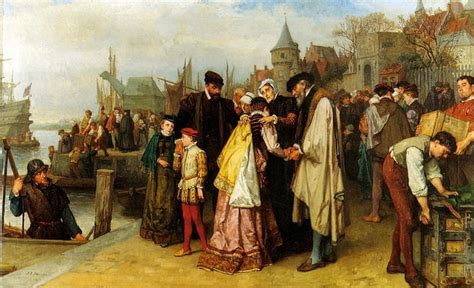Origins and Beliefs
The Huguenots were a French Protestant minority during the 16th and 17th centuries. Originating from the Calvinist movement, they advocated for a more austere and literalist interpretation of the Bible, rejecting practices such as the veneration of saints and the authority of the Pope.

Persecution and Wars
The Catholic majority in France viewed the Huguenots as a threat to religious and political stability. Persecution escalated after the St. Bartholomew’s Day Massacre in 1572, where thousands of Huguenots were killed. The Edict of Nantes (1598) granted the Huguenots limited toleration, but tensions persisted.
Edict of Fontainebleau and Revocation
In 1685, King Louis XIV revoked the Edict of Nantes, effectively outlawing Protestantism in France. Huguenots faced severe repression, including the destruction of churches, forced conversions, and persecution.
Diaspora and Legacy
The revocation of the Edict of Nantes led to a mass exodus of Huguenots from France. They settled in various countries across Europe and beyond, including the Netherlands, England, Germany, and the Americas. The Huguenots’ influence on these societies extended to commerce, culture, and intellectual life.
Key Points
- The Huguenots were a French Protestant minority who emerged during the 16th century.
- They adhered to Calvinist beliefs and faced persecution from the Catholic majority.
- The St. Bartholomew’s Day Massacre (1572) marked a turning point in the persecution of Huguenots.
- The Edict of Nantes (1598) granted limited toleration, but was revoked in 1685.
- The Huguenots’ expulsion from France resulted in a diaspora that had significant cultural and economic impacts.
Impact on European and American History
The Huguenot diaspora had a profound impact on European and American history. Their skills and contributions enriched the economies and societies of their new homes. In the United States, Huguenots played influential roles in the American Revolution and the founding of the nation.
Table 1: Persecution of Huguenots
| Year | Event |
|---|---|
| 1562 | First War of Religion |
| 1572 | St. Bartholomew’s Day Massacre |
| 1598 | Edict of Nantes |
| 1685 | Revocation of the Edict of Nantes |
Table 2: Huguenot Diaspora Destinations
| Country | Number of Huguenots |
|---|---|
| Netherlands | 150,000 |
| England | 50,000 |
| Germany | 25,000 |
| United States | 15,000 |
Table 3: Huguenot Contributions in the United States
| Area | Contribution |
|---|---|
| Economy | Textile industry, banking |
| Politics | Thomas Paine, Alexander Hamilton |
| Culture | Architecture, music, literature |
Table 4: Notable Huguenots
| Name | Occupation |
|---|---|
| John Calvin | Religious reformer |
| Admiral Gaspard de Coligny | Huguenot leader |
| Henry IV | King of France |
| Denis Papin | Inventor of the steam engine |
Common Mistakes to Avoid
- Confusing Huguenots with other Protestant groups in France.
- Assuming that Huguenots were a homogeneous group without internal diversity.
- Overlooking the impact of the Huguenot diaspora on European and American history.
FAQs
-
Who were the Huguenots?
– The Huguenots were a French Protestant minority who emerged during the 16th century. -
What were the main beliefs of the Huguenots?
– The Huguenots adhered to Calvinist beliefs, emphasizing a literalist interpretation of the Bible and the authority of Scripture alone. -
Why were the Huguenots persecuted?
– The Huguenots were persecuted because they challenged the Catholic majority’s religious and political authority. -
What was the significance of the Edict of Nantes?
– The Edict of Nantes (1598) granted limited toleration to the Huguenots and allowed them to practice their religion freely in certain areas of France. -
What were the consequences of the Revocation of the Edict of Nantes?
– The Revocation of the Edict of Nantes (1685) led to a mass exodus of Huguenots from France and severe persecution of those who remained. -
How did the Huguenot diaspora impact European and American history?
– The Huguenot diaspora enriched the economies, societies, and cultures of various countries, including the Netherlands, England, Germany, and the United States.
